Resistance To A Mormon President The Same As It Was In 1967
Mitt Romney faces the same resistance to the idea of a Mormon President that his father did when he ran for President four decades ago.
A new Gallup poll suggests that public resistance to the idea of a Mormon President is virtually unchanged since Mitt Romney’s father ran for President 45 years ago:
PRINCETON, NJ — Eighteen percent of Americans say they would not vote for a well-qualified presidential candidate who happens to be a Mormon, virtually the same as the 17% who held this attitude in 1967.
The exact percentage of Americans who resist the idea of voting for a Mormon has varied slightly over the eight times Gallup has asked the question, typically when a Mormon was running for president, including George Romney (1968 campaign), Orrin Hatch (2000 campaign), and Mitt Romney (2008 and 2012 campaigns). The percentage opposed to a Mormon president has averaged 19% since 1967 — from a low of 17% at several points to a high of 24% in 2007. The current 18% is down from 22% a year ago.
Gallup originally asked the question in April 1967, after Mitt Romney’s father, Michigan Gov. George Romney, announced the formation of an exploratory committee for the 1968 Republican nomination. At that point, George Romney was one of the two top contenders for the GOP nomination, along with the eventual winner, Richard Nixon.
Now, some 45 years later, George Romney’s son Mitt will be the Republican nominee — and the pattern of resistance to his Mormon religion has essentially not changed.
Gallup’s chart tells the tale:
The poll also finds that anti-Mormon sentiment varies with education — only 6% of those with a postgraduate education say they would never vote for a Mormon for President, while the number is 23% percent among those with a High School education or less — and political affilation, with 10% of Republicans, 18% of Independents and 24% of Democrats. That political split is one that we’ve seen in other recent polls, as James Joyner noted in a recent post here at OTB.
What’s most interesting, though, is that it doesn’t seem like this anomalous bias against Mormons would have much of an impact on Mitt Romney’s candidacy, because the people who actually know what his faith is are the least likely to vote against someone because they’re Mormon:
It’s also worth noting that this is a poll of Adults, not Registered or Likely Voters, and that a full 39% of those surveyed either don’t know what Romney’s faith is, or incorrectly identify as something other than what it actually is. So, it’s unclear that this actually means anything for the election.
Nonetheless, as Gallup notes, the resistance to a Mormon candidate and its consistency over a 45 years period is an anomaly. Over the same period of time, we’ve seen resistance to Presidential candidates of other faiths decline significantly, as as resistance to the idea of a female President. Indeed, in 2008 one of America’s two major political parties was at the point where its Presidential candidate was either going to be a woman or an African-American man and in that year, just 45 years after Martin Luther King Jr’s “I Have A Dream” Speech, we elected an African-American to the Presidency. Outside of Mormons, the only religious groups that don’t seem to have benefited from four decades of increased public acceptance are atheists and Muslims.
Why haven’t the numbers changed at all when it comes to Mormons? Partly, it may simply be the fact that there haven’t been many prominent Mormon’s in national politics. After George Romney ran in 1968, there wasn’t a Mormon candidate for President until Orrin Hatch’s ill-fated run in 2000, which didn’t receive much media attention at all largely because it didn’t last very long. Mitt Romney’s 2008 campaign for President was really the first high-profile Presidential campaign by a Mormon candidate since his father had run for President, and then this year, for a time, we had two Mormons competing for the Republican nomination. Add into that the fact that Mormons are a relatively small percentage of the American public, and perhaps it’s a lack of familiarity that explains all of this. This is one of the reasons, I think, why you are seeing stories in the press about Mitt Romney’s faith. It’s something that not a lot of Americans are familiar with, and that leads to a certain degree of interest in the subject on the part of the press. Whether this coverage will impact Mitt Romney’s candidacy in 2012 in either a negative or positive way, though, is a question that only time will be able to answer.
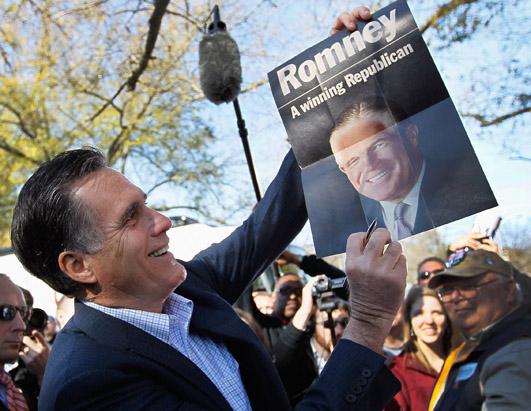
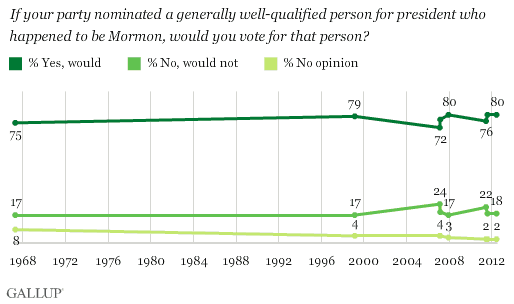


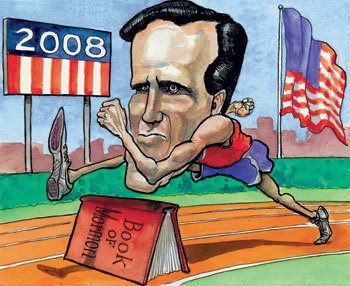

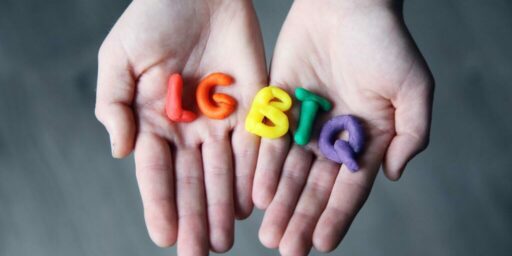
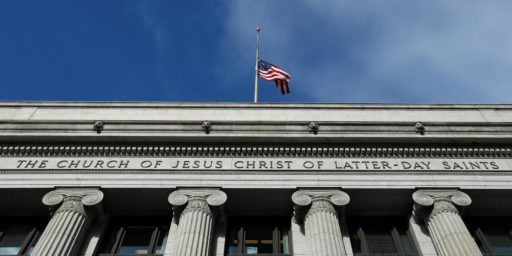
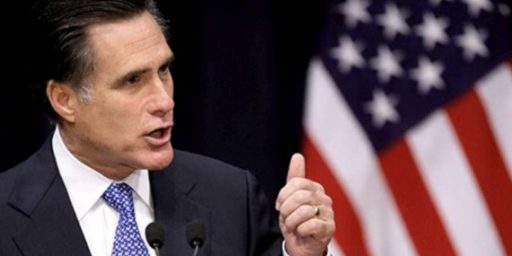
I’m rather curious as to why you think atheists are a religious group.
For demographic purposes, when one breaks down people based on self-identified religious faith, Atheist/Agnostic/No Religion are always among the categories
@Doug Mataconis:
What the poll doesn’t tell us is if those more educated are more informed about his faith.
If a less educated person gets more informed would that person then be less likely to not vote for a Mormon?
Mmm, nah. There’s really only one reason for it. It’s the obvious donkey in the room.
Regarding that polling data, it’s not surprising. Evangelical Protestants are not a growth demographic. Ergo the overall percentage share of anti-Mormonism in the body politic necessarily would have remained fairly constant.
Concerning Romney and November, I think we already know the answer. A few million evangelicals will stay home and not vote. Romney either will win or he’ll lose a close one. If he wins it’s a moot point. If he loses it quite likely will be as a result of the non-voting evangelical bloc, who, ironically enough, won’t be able in that event even to grasp the irony.
I wish they would break this down further. Will people not vote for a Mormon because of the religious beliefs, or is it because Mormons are perceived as very socially conservative?
Steve
Another possibility is that there is a group of respondents who don’t know much about Mormons, are not following the political campaigns, are kind of vaguely aware that some people have some issues with Mormons and figure that where there’s smoke there’s fire, and so therefore when they’re asked, say that they’d have trouble voting for a Mormon for some reason or other.
I think there are some unique factors to the anti-Mormon bais: the secrecy; its recent origins; the strongly patriarchal power structure; and its recent history of racism. Other religions have some of these, but none really combine them all like Mormonism, and I suspect that the combination could have an impact on those who know about them.
Another thought: I feel the strong impulse to say “I’m not defending religious bias here!” (which is true, I’m not) as a self-protective measure. Publicly admitting any form prejudice is so anathema and the charge so incendiary that admitting that you wouldn’t vote for a Mormon is not an easy stand to take. So, I guess I”m going contra DRS and arguing that probably there are some anti-Mormon feelings that aren’t being captured here.
I can’t say this concerns me. More educated voters apparently have no problem with Romney’s faith (just a small percent of post-docs) and I think Democrats would fall in line if one of their own ran, like Harry Reid (not that I see that happening). There were, sadly, some Republicans uncomfortable with voting for a Black man, and Obama did fine.